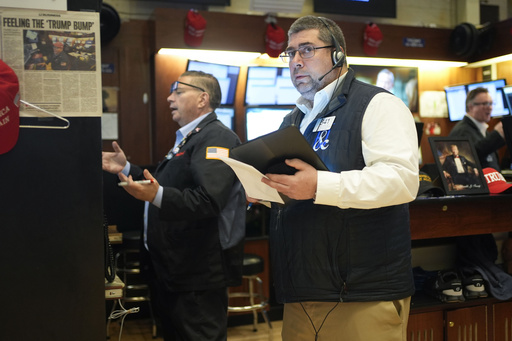
NEW YORK — Wall Street is experiencing a return to stability on Tuesday, with technology stocks propelling U.S. stock indices upward following a favorable profit report from Palantir Technologies, a company significantly impacted by the growth of artificial intelligence.
As of 2:01 p.m. Eastern time, the S&P 500 saw an increase of 0.5%, rebounding from significant fluctuations the previous day, which were driven by concerns that President Donald Trump’s tariffs could initiate a trade war detrimental to global economies, including the United States.
The Dow Jones Industrial Average rose by 46 points, or 0.1%, while the Nasdaq composite recorded a 1.1% increase.
On Monday, Trump decided to postpone his taxes on imports from Canada and Mexico for an additional month. This announcement, made after the market closed, rekindled the hopes of investors on Wall Street that Trump’s aggressive tariff rhetoric might be more of a negotiation tool than a commitment. The prevailing sentiment is that he may see tariffs as leverage in discussions with trade partners rather than a permanent measure.
This optimism is partly based on the belief that the potential adverse effects on Wall Street could dissuade Trump from pursuing a prolonged trade conflict. Historically, Trump has identified the stock market’s performance as a reflection of his presidency’s approval.
However, the threat of a trade war remains a possibility, and some analysts caution that future market fluctuations could still arise due to the seriousness of Trump’s aggressive stance.
Bank of America strategists, led by Mark Cabana, highlighted in a research report that the equity market appears to serve as a gauge of the U.S. administration’s policies, suggesting that any detrimental changes to risk assets will be swiftly reversed. They advise investors to remain vigilant.
A significant aspect of the ongoing tariff discussion is the transactional approach of the Trump administration, emphasizing that “nothing is settled until it is final.” For instance, Trump is moving forward with a 10% tax on U.S. companies importing goods from China, and in response, China announced its own tariffs on certain U.S. imports as well as an antitrust investigation into Google.
Notably, the 15% tariff on U.S. coal and liquefied natural gas, along with a 10% tariff on crude oil, agricultural machinery, and large-engine vehicles from the U.S., is set to begin on Monday. This timing provides an opportunity for further negotiations between Trump and Chinese President Xi Jinping.
Many on Wall Street perceive the tariffs on China as distinct from Trump’s actions against other trading partners. There is a belief that Trump may maintain these tariffs longer than others as part of his strategy to distance the U.S. from its geopolitical competitor.
Beyond China, analysts predict that Canada, Mexico, the European Union, and other U.S. allies are more likely to offer concessions instead of imposing tariffs, according to insights from strategist Thierry Wizman at Macquarie.
Meanwhile, the stock price of Google’s parent company, Alphabet, increased by 1.8% in anticipation of its upcoming earnings report set to be released after market closure.
In addition to this, stocks that experienced large swings the day prior due to tariff concerns have steadied. Auto manufacturers, which had seen declines due to their production bases in Mexico, rebounded as General Motors rose by 1.6% and Ford climbed 2.3%.
Focus on the U.S. earnings reports is heightened, especially in a climate where trade war anxiety could overshadow them.
Palantir Technologies stood out with a remarkable 22.1% increase in stock value after surpassing profit expectations and forecasting future revenue that exceeded analyst predictions. Palantir’s CEO stated that the company is positioned centrally in the “AI revolution.”
In contrast, pharmaceutical giant Merck saw a significant drop of 9.9% despite reporting better-than-expected sales and profits. The company’s guidance for future revenue fell short of expectations, partially due to a halt in shipments of a leading product to China.
In the bond market, Treasury yields decreased after a report indicated a slower pace of job growth, which may ease inflation pressures. Job openings fell below economists’ forecasts at the end of December, suggesting a healthy, albeit slowing, labor market.
The yield on the 10-year Treasury dipped to 4.52%, down from 4.56% on Monday, while the two-year yield, closely tied to Federal Reserve interest rate expectations, eased to 4.22% from 4.25%.
On international markets, London’s FTSE 100 fell by 0.1%, although other major European markets experienced slight gains.
Over in Asia, Hong Kong’s Hang Seng surged by 2.8%, while South Korea’s Kospi rose by 1.1%.

